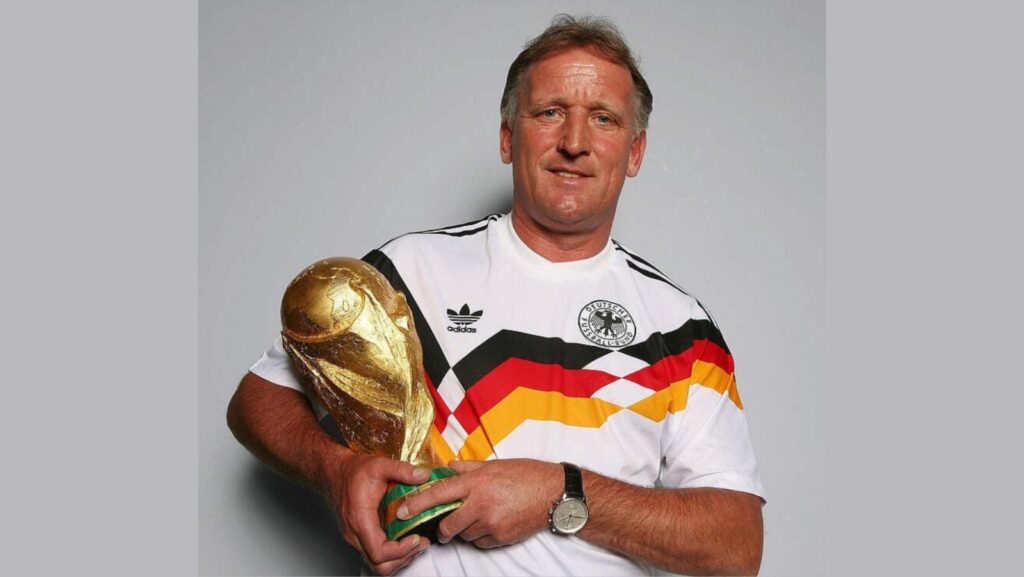
For West Germany, Italia ’90 was an epochal tournament in more ways than one. The Berlin Wall had fallen months earlier, and unification was on the cards. Stars from the East like Matthias Sammer would soon be part of the national side, and there was pressure on Franz Beckenbauer to replicate his legendary feats as a player from the touchline.
Andreas Brehme was one of the stalwarts of the squad, having won over 50 caps since his debut in 1984. It was his left-footed piledriver from the right side of the penalty box that Joel Bats fumbled into his own net in Guadalajara in the 1986 World Cup semi-final, as a highly fancied French side that had beaten the Brazil of Zico and Socrates were once again tripped at the penultimate hurdle.
But Beckenbauer and his squad knew the truth. It had been a generation since Germany had shown their true colours on the world stage. Not since Beckenbauer himself lifted the trophy in Munich in 1974 had there been a German side that was universally admired. The disappointing title defence in 1978 included a loss to Austria in Cordoba, and the ‘fix’ against the same opponents in Gijon four years later will forever be a stain on German football. Apart from that disgrace, most remembered the 1982 tournament for Harald Schumacher’s shocking challenge that left France’s Patrick Battiston unconscious and missing several teeth.
Even in 1986, progress to the final hid many flaws. Unconvincing in a 1-1 draw against Uruguay, West Germany were schooled 2-0 by a magnificent Danish side in their last group game. They needed a late goal from Lothar Matthaus to beat Morocco in the last 16, and a penalty shootout to get past Mexico, the hosts, in the quarterfinals. The 3-2 scoreline in the final, courtesy two opportunistic finishes from Karl-Heinz Rummenigge and Rudi Voller, merely hid how much Argentina had bossed vast tracts of the game.
It helped immensely that they started the 1990 World Cup at ‘home’, in Milan’s atmospheric San Siro. Matthaus and Brehme were cult heroes in the city, having moved there in the summer of 1988 and immediately winning Internazionale their first Serie A title in nearly a decade. Jurgen Klinsmann joined the following summer, and all three were on familiar turf when they kicked off with the toughest of assignments, against a formidable Yugoslavia team that contained several of the young stars who had won the U-20 World Cup in thrilling fashion in 1987.
Brehme had the most eventful of opening 20 minutes. After being clipped on the heel early on, he exacted retribution with a scything tackle on Zoran Vulic that earned him a yellow card. Soon after, a free kick in a position eerily similar to the 1986 semifinal was sent tamely into the goalkeeper’s hands. On the sideline, you could sense Beckenbauer’s frustration.
It was no surprise then that it was the talismanic Matthaus who settled nerves just before the half hour, collecting a pass with his back to goal and arrowing a left-footer into the far corner. But with Yugoslavia having so many game-changers, not least the dazzlingly talented Dragan Stojkovic, it was a precarious lead.
Once again, it was the Inter connection that eased German fans’ fears. With 39 minutes on the clock, Brehme went on one of his typical forays down the left flank. The cross he delivered was the sort that centre forwards dream of, with pace and whip and right to the edge of the six-yard box. Klinsmann met it with a perfect glancing header and it was 2-0.
Goals from Davor Jozic and Matthaus – a superb slalom run from inside his own half finished off with a rocket of a shot – made it 3-1, but it would be Brehme who had the last word. As if to show off his ambidextrous skill, he cut it from the left and then left fly with his right boot. Tomislav Ivkovic in the Yugoslavia goal fumbled, and Rudi Voller was on hand to bundle it in.
ALSO READ: Andreas Brehme, German World Cup Hero of Italia ’90, Passes Away
The 4-1 win was an emphatic statement of intent, but there were still nerves aplenty when the Germans returned to the San Siro to take on the Netherlands in the round of 16. The Dutch had beaten them with a last-gasp goal in the Euro ’88 semis, and had their own Milanese trinity – Ruud Gullit, Marco van Basten and Frank Rijkaard.
Another delightfully deft Klinsmann finish from an acute angle gave Germany the edge, but it was Brehme that applied the finishing touches with his lesser-used right boot, curling the ball into the far top corner past Hans van Breukelen. In the Turin semi-final against England, it was his deflected free-kick, left foot this time, that gave the Germans the lead, and he was on hand again to dispatch the team’s first shot in the penalty shootout.
A scrappy, ill-tempered final against Argentina came down to an 85th minute penalty. Matthaus, the captain, would have taken it, in normal circumstances. But he was wearing new boots that day and felt uneasy. It was Brehme that stepped up instead, using his right foot to tuck it past Sergio Goycochea.
In a sense, it was fitting that the day Brehme passed away, February 20, the San Siro hosted a Champions League round-of-16 clash between Inter and Atletico Madrid. There were several tributes to Brehme, in the stands and on the pitch, before the game. Inter legend. German World Cup winner. One of the most versatile full-backs of all time. The game is poorer without him.
For latest sports stories: click here



